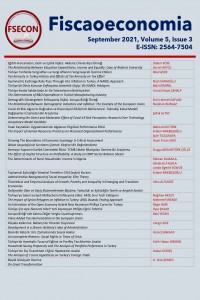Türkiye’nin Dış Ticaretinde J Eğrisi Hipotezinin Analizi
The Analysis of J Curve Hypothesis on Turkey’s Foreign Trade
Author(s): Hakan GüneşSubject(s): Supranational / Global Economy, International relations/trade, Evaluation research, Financial Markets
Published by: Ahmet Arif Eren
Keywords: J curve; Exchange Rate; Export; Import; Johansen test;
Summary/Abstract: J Curve Hypothesis stated that the foreign trade balance may worsen at the beginning in the short term, but it will improve later in the long term after the devaluation. According to the hypothesis, the foreign trade balance will worsen because it does not react immediately against price changes in the exchange rate in the short term. However, the foreign trade balance will improve thanks to doing some regulations in the long term.The reason for that is related to Marshall-Lerner's condition. Marshall-Lerner condition means that the total export and import price elasticities is bigger than 1 which is based on J Curve. In this study, it was investigated whether the J Curve Hypothesis is valid in Turkey.It was done the short and long term causality, cointegration and FMOLS test which showing the nondeviating coefficients of the relationship, with the data-containing the monthly time series for the period of January 2010-September 2019. As a result of the analysis, the real effective exchange rate is not a reason for export in the short term. That’s why the J Curve in Turkey has reached the conclusion that is not valid. However, the real effective exchange rate is a reason for imports in the short term. In the long run, there is a causal relationship between the real Exchange rate and exports and imports. Johansen cointegration test has been carried out since the variables 1.difference and a long-term relationship between real effective exchange rates and exports and imports has been identified. According to the FMOLS estimator, a 1 unit increase in a real effective exchange rate increases export by 0.33 units and import by 0.439 units. This indicates that foreign trade deficits in Turkey will continue in the long run.
Journal: Fiscaoeconomia
- Issue Year: 5/2021
- Issue No: 3
- Page Range: 1175-1190
- Page Count: 16
- Language: Turkish

